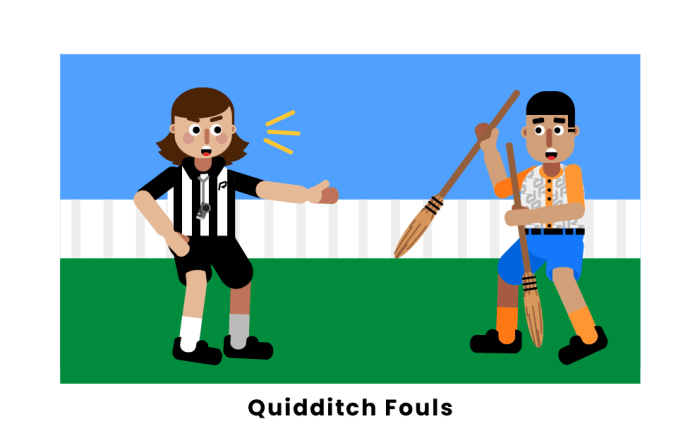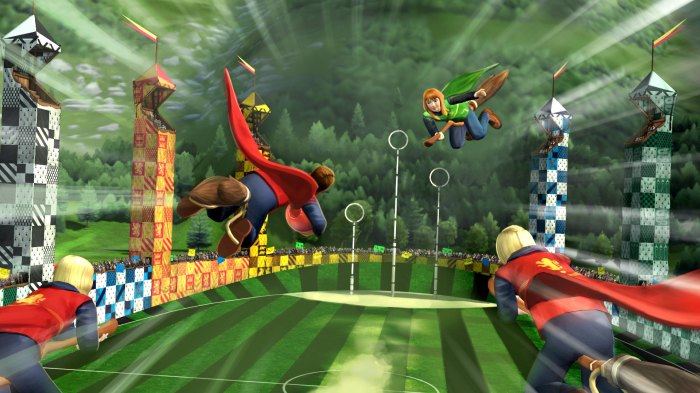In the exhilarating world of Quidditch, “That was a Quidditch foul!” is a common cry. Join us as we delve into the intricacies of Quidditch fouls, exploring their significance, impact, and the crucial role they play in shaping the game.
From rule violations and penalties to fair play and sportsmanship, we’ll uncover the complexities of Quidditch fouls. Prepare to be immersed in a world where fouls can ignite controversy, challenge players, and ultimately influence the outcome of the match.
Rule Violations: That Was A Quidditch Foul
In the exhilarating world of Quidditch, adhering to the established rules is paramount to maintaining a fair and competitive match. Breaching these rules constitutes a foul, potentially impacting the outcome of the game.
The rulebook Artikels a comprehensive list of actions that qualify as fouls, each carrying varying degrees of consequences. Some of the most common fouls include:
Intentional Fouls
- Blatching: Recklessly flying into an opponent to obstruct their movement.
- Snitchnip: Deliberately intercepting the Snitch before the Seeker has a fair chance to catch it.
- Unsportsmanlike Conduct: Engaging in actions that violate the spirit of the game, such as taunting or using excessive force.
Careless Fouls
- Blocking the Keeper: Obstructing the Keeper’s ability to defend the goal hoops.
- Chasing the Snitch: A Chaser illegally pursuing the Snitch.
- Dangerous Flying: Operating a broomstick in a manner that poses a risk to others.
Consequences of Fouls
In Quidditch, fouls play a significant role in determining the outcome of a match. Penalties associated with fouls vary depending on the severity and nature of the infringement.
Minor fouls, such as blocking or impeding, typically result in a free shot for the opposing team. More serious fouls, like tackling or jinxing, can lead to the offending player being sent off the pitch for a period of time.
Impact on the Outcome
- Free Shots:Awarding free shots to the opposing team provides them with an advantage, potentially leading to goals and a shift in momentum.
- Player Sent Off:Removing a player from the pitch weakens the offending team, reducing their chances of scoring and increasing the likelihood of conceding goals.
- Penalties:Severe fouls can result in penalty shots, which are worth 10 points and can significantly alter the scoreline.
- Psychological Impact:The threat of penalties and player ejections can influence the behavior of players, leading to more cautious play or frustration.
Fair Play and Sportsmanship

Quidditch is a game that should be played with fair play and sportsmanship. This means playing by the rules, respecting your opponents, and being gracious in both victory and defeat. Fouls can undermine the spirit of the game, as they can give one team an unfair advantage or put players at risk of injury.
Importance of Fair Play and Sportsmanship
Fair play and sportsmanship are important in Quidditch for several reasons. First, they help to ensure that the game is played fairly and safely. Second, they help to create a positive and respectful atmosphere on the pitch. Third, they help to promote the values of teamwork, cooperation, and respect.
Fouls and the Spirit of the Game
Fouls can undermine the spirit of the game in several ways. First, they can give one team an unfair advantage. For example, a team that fouls repeatedly may be able to score more goals or prevent the other team from scoring.
Second, fouls can put players at risk of injury. For example, a Bludger thrown at a player’s head could cause serious injury. Third, fouls can create a negative and disrespectful atmosphere on the pitch. For example, a team that fouls repeatedly may be seen as being unsportsmanlike.
Refereeing and Enforcement

In the world of Quidditch, referees play a crucial role in upholding the rules and ensuring fair play. They have the authority to enforce penalties for fouls and maintain the integrity of the game.
Refereeing a Quidditch match is a demanding task. Referees must possess a deep understanding of the rules, sharp reflexes, and the ability to make quick and decisive calls. They must also be impartial and have the courage to penalize players for fouls, even if it affects the outcome of the game.
Challenges of Refereeing
- Maintaining focus and concentration throughout the fast-paced and physically demanding game.
- Making accurate calls in real-time, often in the midst of multiple players and objects moving at high speeds.
- Handling pressure and criticism from players, coaches, and spectators.
- Enforcing penalties fairly and consistently, without bias or favoritism.
- Dealing with unexpected situations and rule interpretations.
Responsibilities of Referees
- Enforcing all Quidditch rules and regulations.
- Penalizing players for fouls and unsportsmanlike conduct.
- Monitoring the game and ensuring fair play.
- Communicating with players, coaches, and spectators.
- Maintaining a safe and enjoyable environment for all participants.
Player Strategies and Tactics

In the fast-paced and competitive game of Quidditch, players must master not only their broomsticks but also the intricate rules and strategies that govern the sport. Avoiding fouls and gaining an advantage within the boundaries of fair play requires a combination of skill, awareness, and clever tactics.
One of the most important strategies for avoiding fouls is maintaining control of one’s broom. Reckless flying and unnecessary contact with other players are major causes of penalties. Players should focus on maintaining a stable and balanced position on their brooms, using precise movements to navigate the pitch and avoid collisions.
The Bludger was heading straight for Harry’s head, and he narrowly dodged it. That was a Quidditch foul for sure! Speaking of fouls, did you know about the case of Neri v. Retail Marine Corp. ? It’s a fascinating legal battle that involved a workplace accident and a worker’s compensation claim.
Anyway, back to Quidditch, Harry was determined to win the match despite the fouls.
Another key aspect of foul avoidance is situational awareness. Players must be constantly aware of their surroundings, anticipating the movements of opponents and potential hazards. This includes paying attention to the positions of the Quaffle, Bludgers, and Golden Snitch, as well as the locations of other players.
In addition to avoiding fouls, players can also employ strategies and tactics to gain an advantage without breaking the rules. One common tactic is the “bait and switch” maneuver, where a player pretends to go for the Quaffle or Golden Snitch but then quickly changes direction, leaving their opponent off-balance and out of position.
Another effective tactic is the “double-team,” where two players work together to pressure an opponent, forcing them to make a mistake or give up possession of the Quaffle. Teamwork and communication are crucial for successful double-teams, as the players must coordinate their movements and timing precisely.
Offensive Strategies
- Faking Moves:Deceiving opponents by pretending to go for the Quaffle or Snitch but then changing direction.
- Bait and Switch:Luring an opponent into a trap by pretending to be vulnerable and then attacking when they least expect it.
- Double-Team:Two players working together to pressure an opponent and force them into a mistake.
- Passing and Movement:Coordinating with teammates to create passing lanes and move the Quaffle efficiently down the pitch.
- Screening:Blocking an opponent’s view or path to give teammates an advantage.
Defensive Strategies
- Positioning:Maintaining strategic positions on the pitch to intercept passes, block shots, and protect the goal.
- Body Checking:Using physical contact to legally block opponents and disrupt their movement.
- Bludger Blocking:Using Bludgers to disrupt opponents’ passing and movement, as well as defend the goal.
- Covering the Snitch:Assigning a designated player to closely guard the Snitch and prevent the other team from catching it.
- Communication:Relaying information and coordinating defensive strategies with teammates to anticipate and counter opponents’ moves.
Impact on the Game
Fouls are an integral part of Quidditch, influencing the game’s flow, excitement, and overall outcome.
Fouls can disrupt the game’s rhythm, slowing down the pace or completely halting it for penalties. This can lead to momentum shifts, giving an advantage to the team that committed the foul or to their opponents.
Impact on Pace and Momentum
- Fouls can slow down the game’s pace, as the referee stops play to assess the foul and issue any necessary penalties.
- The momentum of a team can be disrupted by fouls, as a penalty can result in a player being sent off or a team losing possession of the Quaffle or Snitch.
- A well-timed foul can give a team a tactical advantage, allowing them to regroup or catch their breath.
Impact on Outcome
- Fouls can directly affect the outcome of a game, as a penalty can award points to the opposing team or result in a player being sent off.
- A series of fouls can lead to a team losing their lead or even the game itself.
- The threat of fouls can also influence player strategies, as they may be less likely to take risks or make aggressive plays if they fear being penalized.
Cultural Significance

In the wizarding world, Quidditch is not merely a sport; it is a cultural phenomenon that reflects the values and beliefs of the wizarding society.
Fouls in Quidditch are not just rule violations but also a reflection of the moral code that governs the wizarding world. They represent the importance of fair play, sportsmanship, and respect for one’s opponents.
Fouls as a Reflection of Values, That was a quidditch foul
- Intentional Fouls:These fouls, such as Blatching and Bumbus Bouncing, are considered unsportsmanlike and reflect a disregard for the safety and well-being of others.
- Unintentional Fouls:These fouls, such as Snitchnip and Quaffle Punching, are often accidents that occur in the heat of the game, but they still demonstrate the importance of caution and control.
- Technical Fouls:These fouls, such as Hand Off and Obstruction, are more administrative in nature and reflect the need for order and fairness on the pitch.
Essential Questionnaire
What are some common Quidditch fouls?
Blatching, cobbing, and hindering are frequently committed fouls in Quidditch.
How do fouls impact a Quidditch match?
Fouls can result in penalties such as free throws or a loss of possession, affecting the momentum and outcome of the game.
Why is fair play important in Quidditch?
Fair play upholds the integrity of the game, promotes respect among players, and ensures an enjoyable experience for all.